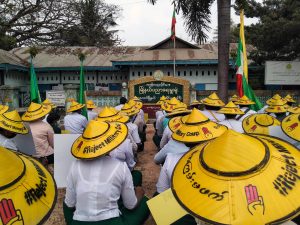Myanmar’s Spring Revolution is now in its third year since the February 2021 military coup. Despite facing brutal repression, including arson attacks and aerial bombardment by Myanmar’s state security personnel, ordinary people across the country are continuing to resist the return to dictatorship. What explains the extraordinary resilience of their civil disobedience and armed resistance efforts?
Roots of Resilience
Many in Myanmar are furious about the return to tyranny and the bleak implications for them, their children, and their country. These grievances have been channeled into the revolutionary struggle over the past two years, which has been sustained by a deeply-ingrained culture of reciprocity, charity, and philanthropy that has developed over decades. Indeed, many of the ideas and practices of self-reliance, reciprocity and moral citizenship now at the core of the Spring Revolution have roots in the fitful post-socialist market reforms of the 1990s and 2000s.
In my book, “Outsourcing the Polity: Non-State Welfare, Inequality and Resistance in Myanmar,” I draw on extensive fieldwork to explore the origins of Myanmar’s vibrant non-state welfare sector. Examining the political economy of provincial economic liberalization after the collapse of the Burma Socialist Program Party in 1988, I uncover how state officials encouraged the provision of social aid and public goods by non-state actors. Sub-national military commanders suppressed anti-junta and democratic party activity but permitted ostensibly “apolitical” welfare-oriented village and neighborhood groups to flourish. Meanwhile, regional junta officials issued commercial licenses and tax exemptions to businesspeople who assumed roles as informal civilian administrators and often became patrons of both government-sponsored and grassroots welfare groups.
Outsourcing enabled dire state social austerity; the junta of the 1990s slashed social expenditure and used the funds to instead double the size of the armed forces. Alongside often fragile commercial ceasefires reached with ethnic armed elites, transferring social responsibility to the non-state sector allowed Myanmar’s military to focus instead on forcefully expanding the central state into restive borderland regions.
Democratic Outsourcing
The legacies of post-1988 social outsourcing continued to shape the character of politics after the military initiated a transition to partial civilian rule in 2011. Both the Thein Sein (2011-2016) and Aung San Suu Kyi (2016-2021) administrations continued to encourage charities, philanthropists, the private sector, and religious communities to perform social welfare and development roles, often in exchange for tax deductions. Rather than turn to the state to deliver social development, communities were told by their elected representatives to rely on each other and the “free market” to solve social problems.
Community groups even ran quarantine facilities and fundraised for the government’s vaccination procurement program amid the COVID-19 pandemic, at the encouragement of Aung San Suu Kyi herself. Meanwhile, after 2010, tycoons sought to remake their public reputations and protect their questionably accrued assets from taxation or redistribution by helping to fill the gaps in social provisioning left by decades of austerity.
The military’s February 2021 ousting of elected civilian leaders has spawned thousands of new groups in neighborhoods and villages across the country. These networks are helping to support the needy, resource pro-democracy militias, provide education to children fleeing violence and deliver social governance in large areas of the country that are no longer military-controlled. They are also at the vanguard of imagining and enacting alternative social ideals and models to dictatorship which reject the militarization and economic exploitation of the so-called “democratic decade” (2011-2021).
Yet few of these groups receive any funds from the international community – even though they are playing crucial humanitarian and social roles. In one township in Sagaing Region, for instance, an alliance of local social actors including welfare groups, militias, traders, and striking teachers are helping to resource and run a network of more than a dozen schools that are educating thousands of young people. Initiatives like theirs currently receive almost no foreign aid but are performing essential social governance functions in the wake of the junta’s administrative collapse in most rural and borderland areas of the country. Foreign governments and humanitarian actors must ensure these networks are far better resourced as the dictatorship continues to cling to power.
The remarkable role of non-state welfare actors and ideals in sustaining Myanmar’s democratic struggle has implications for understanding distributive politics, autocratic legacies and civil resistance elsewhere. For now, though it is clear that a new wave of social outsourcing is underway in Myanmar – one that is simultaneously deepening communal self-reliance while also sustaining the fight for a more inclusive and democratic future.
This article was originally published by the Center for International Studies at Cornell University. It is reprinted with permission.

































